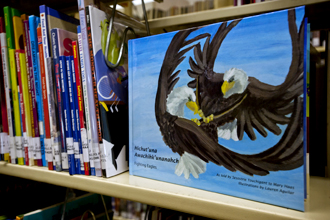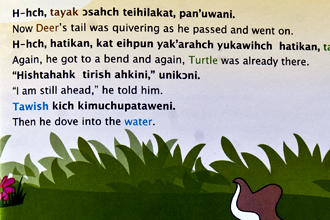Tribe Turns to Tulane to Revive Language
When members of the Tunica-Biloxi tribe wanted help restoring their native language, they turned to students and faculty in the Tulane Interdisciplinary Program in Linguistics for help. How could a group of volunteers resuscitate the extinct language?

This book written in the Tunica language is now in the hands of children in the tribe. (Photos by Paula Burch-Celentano)

Two fables come to life in the book, which was developed by a linguistics team from Tulane.
Fortunately, they had a key to unlock the language. In 1939, a Harvard linguistics scholar had worked with the last remaining tribe member still conversant in the Tunica language. The scholar documented stories and created a dictionary and grammar for the language.
Led by Judith Maxwell, professor of anthropology and director of the linguistics program, the Tulane group, which consisted of undergraduate and graduate students along with faculty member Nathalie Dajko, spent the past academic year parsing together two Tunica fables and two prayers. With funding from the tribe, they published a book containing the newly rewritten material. Lauren Aguilar, a member of the tribe, created original oil paintings to illustrate the “Fighting Eagles” story.
In May, 650 copies of the book, with the Tunica tales “Deer and Turtle” and “Fighting Eagles,” were distributed at the annual Tunica-Biloxi Pow Wow in Marksville, La., says Katherine Bell, a doctoral student in linguistic anthropology.
“Language is important because it's a way of uniting the tribe,” says Bell. “Language is a really important facet of identity.”
When the tribe's language died, an important part of its heritage was lost, says Raina Heaton, a student in the linguistics master's program. Though the group worked with valuable existing materials, “there's lots missing there's no word [yet] for 'cheese,' 'peace' or 'culture.' We're far from being fluent in Tunica.”
The group plans to develop a new grammar book and expanded dictionary, pronunciation guide and website, as well as training materials and lesson plans for teachers who want to learn and teach the lost Tunica language.
